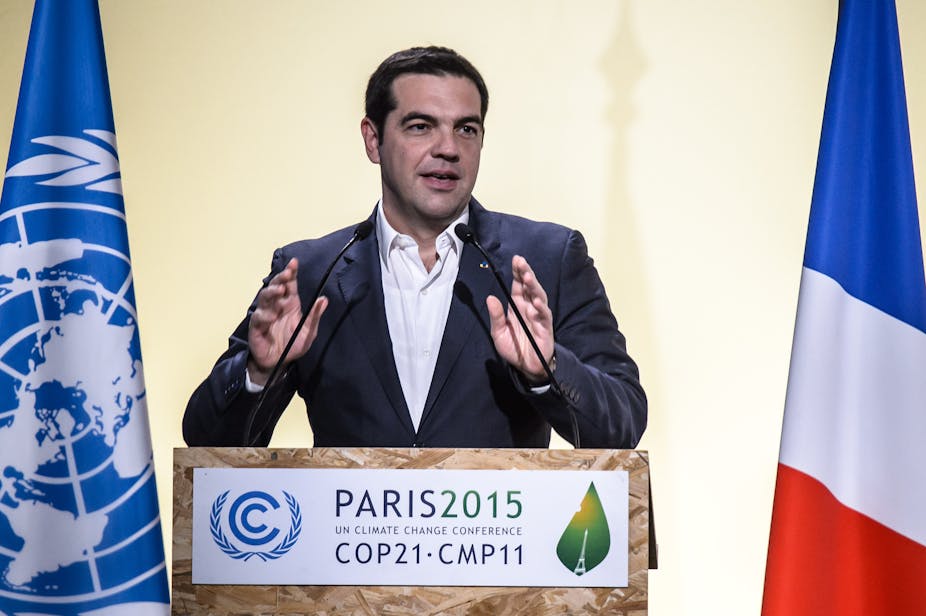With 190 states taking part in the Paris climate talks, there are clearly some for whom the outcome matters more than others. There are the small states, such as Kiribati and the Marshall Islands, for which a deal to reduce global emissions and curb climate change is a matter of survival. Then there are the big players, such as China, the US, Russia and the EU, upon which a deal will rely.
But there are a number of states taking part for which economic crisis at home is their overriding concern. Within the EU bloc, in countries such as Italy, Greece, Spain and Portugal the on-going economic turmoil is of enormous importance.
These countries are all still suffering from the fallout of austerity measures imposed by the EU. Since the start of the eurozone crisis, the Greek economy has shrunk by 25%, the Spanish by 15%, while the Italian and Portuguese economies seem unable to recover and sustain positive growth levels. Meanwhile, domestic demand in these countries is not enough to accelerate economic growth. Similarly, investment is very thin on the ground, as their enfeebled institutions cannot guarantee that investors will get their money back.

Green growth prospects
An agreement on climate change could assist these countries with managing their economic problems and reinventing their economies as environmentally friendly ones. Massive investment in solar and wind energy for example could protect them from highly volatile coal, oil and gas prices. Technological advancements in these renewable energy sources now make this possible as new and improved materials have reduced the cost of investment and improved the performance of wind and solar energy. What is more, such investment would lead to new jobs and industries and enable some, especially Greece and Spain, to control their high unemployment rates.
The sins of the past do not leave much room for optimism on this front, however. It seems that the institutions in these four countries, weakened by deregulation, corruption and judicial bias, lack the ability to implement a series of environmental measures needed to combat climate change effectively. Data on environmental violations in these countries support this view.
Over the last year alone, Italy was fined a record €40m for failing to properly manage the dumping of illegal waste; Greece was charged €10m for lax waste management; Spain was dragged to the EU Court of Justice for the same reason; while Portugal has been accused of inadequate wastewater treatment.

Not just the usual suspects
But it’s not just the economically weak countries who are struggling to enforce the necessary measures to combat climate change. The same might hold true for the European Commission and other EU member states, which are better placed to enforce climate change legislation than Portugal, Italy, Greece and Spain. Weak economic growth across the eurozone might force countries with fragile GDP rates, such as the Netherlands, France, Belgium and Finland to seek less ambitious targets too.
Questions have also been asked about the commitment of the EU as a whole to tackling climate change. The European Commission’s emphasis on growth under Jean-Claude Juncker’s leadership and the merging of the climate change department with that of energy under a new vice-president for Energy Union indicate that climate change might not be a priority.
If we combine the EU’s economic problems with other equally important matters, such as the continuing refugee crisis and recent terrorist attacks, many EU member states will be preoccupied at this climate conference. The bloc’s ability to promote a transition towards low-carbon economies might therefore be limited.
This contradicts the EU’s ambitious funding program, Horizon 2020, which has the goal of transforming the economy through responsible research and innovation. It also casts doubt on the prevalent narrative in the EU which focuses on austerity measures as the catalyst for future growth.
Not only has austerity stifled growth, but it has also prevented the EU from effectively managing the many issues it currently faces and assuming its role as leader in the international political arena. A stronger focus on the goals of COP21 would not only have a wider benefit, but sustainable investment could also help kickstart Europe’s economies too.

